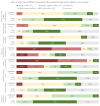Healthcare professionals' perspectives on assessing selected patient-reported outcome measures in specialist palliative care institutions: a multi-country mixed-methods study
- PMID: 40369516
- PMCID: PMC12076854
- DOI: 10.1186/s12904-025-01775-6
Healthcare professionals' perspectives on assessing selected patient-reported outcome measures in specialist palliative care institutions: a multi-country mixed-methods study
Abstract
Background: Despite the growing significance of patient-reported outcome measures (PROMs) for various purposes, including economic evaluations, implementing them effectively in palliative and end-of-life care settings remains a challenge. This study aimed to identify barriers and facilitators to PROMs data collection in inpatient specialist palliative care settings and to assess data collectors' applied perspectives on four relevant PROMs.
Methods: We conducted an explanatory sequential mixed-methods study, including an online survey (N = 29) and qualitative interviews (N = 12) with healthcare professionals and researchers from eleven countries. These participants had direct experience with PROMs data collection in specialist palliative care settings, either as part of the international iLIVE project or the Austrian PallPROMS study. The aim was to identify opportunities for optimising clinical care and other assessment purposes in the future. We conducted a descriptive analysis of the survey data and a thematic analysis of the qualitative data.
Results: The main reflected factors were patients' very limited ability to self-complete PROMs and the optimal timing and duration of assessments. Opinions on the usefulness of different PROMs varied significantly according to the role of the participants. Overall, setting-specific PROMs assessing symptom burden were preferred to more generic quality-of-life/wellbeing measures. Identified barriers and facilitators related to five themes: patient-related factors, data collection processes, PROM type, staff perceptions and organisational factors. Findings also highlighted better information and training needs.
Conclusions: Prioritising care-relevant tools and carefully planning data collection, with main barriers addressed, can significantly increase the successful implementation of PROMs collection in specialist palliative care institutions. Since the preferred PROMs are not directly suitable for health economic evaluation, it is crucial to explore mapping alternatives for this purpose.
Keywords: EQ-5D-5L; ESAS; Economic evaluation; Health-related quality-of-life; ICECAP-SCM; IPOS; Mixed-methods; Palliative care; Patient-reported outcome measures.
© 2025. The Author(s).
Conflict of interest statement
Declarations. Ethics approval and consent to participate: The study did not require ethics approval (confirmed by the Ethics Committee of the Medical University of Vienna). Written informed consent for participation was obtained from all survey and interview participants. Participants were given detailed information about the study prior to their participation, including the purpose of the study, compliance with the General Data Protection Regulation and the right to withdraw at any time without consequences. Consent for publication: Not applicable. Competing interests: The authors declare no competing interests.
Figures



Similar articles
-
Implementing ePROM in specialist palliative home care: the professionals' perspective - a mixed-methods study.Palliat Care Soc Pract. 2023 Aug 6;17:26323524231186827. doi: 10.1177/26323524231186827. eCollection 2023. Palliat Care Soc Pract. 2023. PMID: 37560175 Free PMC article.
-
Barriers and facilitators of electronic patient-reported outcome measures (e-PROMs) for patients in home palliative cancer care: a qualitative study of healthcare professionals' perceptions.BMC Palliat Care. 2023 Aug 4;22(1):111. doi: 10.1186/s12904-023-01234-0. BMC Palliat Care. 2023. PMID: 37542264 Free PMC article.
-
"You need a team": perspectives on interdisciplinary symptom management using patient-reported outcome measures in hemodialysis care-a qualitative study.J Patient Rep Outcomes. 2023 Jan 20;7(1):3. doi: 10.1186/s41687-022-00538-8. J Patient Rep Outcomes. 2023. PMID: 36662325 Free PMC article.
-
What are the attitudes of health professionals regarding patient reported outcome measures (PROMs) in oncology practice? A mixed-method synthesis of the qualitative evidence.BMC Health Serv Res. 2020 Feb 10;20(1):102. doi: 10.1186/s12913-020-4939-7. BMC Health Serv Res. 2020. PMID: 32041593 Free PMC article.
-
Barriers to healthcare professionals screening, recognizing, and managing delirium in the adult patients receiving specialist palliative care: a mixed-methods systematic review.BMC Palliat Care. 2025 Jan 29;24(1):28. doi: 10.1186/s12904-024-01634-w. BMC Palliat Care. 2025. PMID: 39881310 Free PMC article.
Cited by
-
Psychometric properties of the ICECAP-SCM capability-wellbeing measure in specialist palliative care units in Austria.Qual Life Res. 2025 Jul 23. doi: 10.1007/s11136-025-04032-8. Online ahead of print. Qual Life Res. 2025. PMID: 40699256 No abstract available.
References
-
- Dawson J, Doll H, Fitzpatrick R, Jenkinson C, Carr AJ. The routine use of patient reported outcome measures in healthcare settings. BMJ. 2010;340:c186. - PubMed
-
- Knaul F, Radbruch L, Connor SR, de Lima L, Arreola-Ornelas H, Carniado O et al. How many adults and children are in need of palliative care worldwide? In: Connor SR, editor. Global Atlas of Palliative Care. 2nd Edition. London, UK2020.
MeSH terms
Grants and funding
LinkOut - more resources
Full Text Sources
Medical

